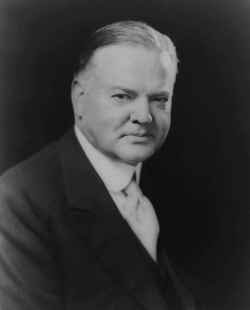
Herbert Hoover (1874)
Achievements
At the outbreak of World War I, Hoover devoted himself to humanitarian efforts, arranging the return of Americans stranded abroad and securing supplies for civilians of war-devastated Europe. Elected president of the US in 1928, his administration was dominated by the economic depression that followed the 1929 stock market crash. Believing the economy would regenerate spontaneously, he was reluctant to extend federal activities. What event spurred Hoover to order federal troops to the capital?
More...
History
Herbert Clark Hoover (August 10, 1874 – October 20, 1964) was the 31st President of the United States (1929–1933). Besides his political career, Hoover was a professional mining engineer and author. As the United States Secretary of Commerce in the 1920s under Presidents Warren Harding and Calvin Coolidge, he promoted government intervention under the rubric "economic modernization". In the presidential election of 1928, Hoover easily won the Republican nomination, despite having no previous elected office experience. To date, Hoover is the last cabinet secretary to be directly elected President of the United States. The nation was prosperous and optimistic at the time, leading to a landslide victory for Hoover over Democrat Al Smith.
Hoover deeply believed in the Efficiency Movement (a major component of the Progressive Era), arguing that a technical solution existed for every social and economic problem. That position was challenged by the Wall Street Crash of 1929 that took place less than eight months after his taking office, and the Great Depression that followed it which gained momentum in 1930. Hoover tried to combat the Depression with volunteer efforts and government action, none of which produced economic recovery during his term. The consensus among historians is that Hoover's defeat in the 1932 election was caused primarily by failure to end the downward economic spiral, compounded by popular opposition to prohibition. Other electoral liabilities were Hoover's lack of charisma in relating to voters, and his poor skills in working with politicians. As a result of these factors, Hoover is typically ranked very poorly among former U.S. presidents.
To know more...



No comments:
Post a Comment